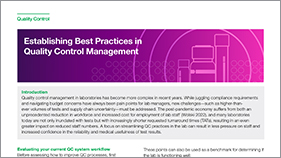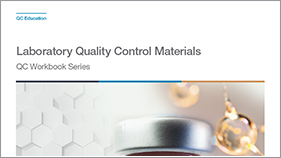
- Share on:
- Bio-rad Twitter
- Bio-rad Facebook
- Bio-rad LinkedIn
How independent QC can help meet quality goals
Introduction
Quality control (QC) plays an important role in laboratory testing, enabling labs to monitor the analytical quality of a procedure, detect errors, and help ensure the reporting of accurate and reliable patient test results. This guide covers the benefits of independent QC, highlighting its significance in maintaining quality goals. Also discussed are key considerations for choosing an independent QC provider that aligns with the laboratory's specific needs.
Independent controls vs instrument manufacturer or in-kit controls
There are typically two sources of quality control materials: instrument manufacturer-supplied controls and independent controls. Instrument manufacturer-supplied controls are provided by the instrument, or test kit manufacturer, while independent controls are designed and manufactured without any involvement from instrument, or test kit manufacturers.
A comparison of independent QC with instrument manufacturer QC reveals the limitations of instrument manufacturer or in-kit controls. These controls are designed for use only on their specific test systems and are often manufactured from the same materials as the calibrators. As a result, the control may closely be similar to the calibrator, making it less sensitive to changes in device performance. This may lead to the acceptance of patient test results with analytical errors that could be medically important. Moreover, manufacturer or in-kit controls often vary with each new reagent lot, potentially mitigating the benefits of long-term QC monitoring.
The benefits of independent QC
Independent controls offer several advantages that can enhance QC testing practices.
Independent controls typically begin with a human base matrix, providing a product that is closely similar to a patient sample. This similarity allows for a better assessment of performances and reduces the risk of unreliable patient results.
Independent QC materials typically have longer shelf lives, enabling the use of the same control lot across multiple lot changes in reagents and calibrators. Instrument manufacturer QC often has shorter shelf lives and may be matched to a specific reagent lot. The longer shelf life provides laboratories with the ability to detect shifts that may occur with new reagents or calibrators, ensuring ongoing quality monitoring.
Overall, independent QC offers unbiased assessments and increased sensitivity to changes in device performance, thereby minimizing the potential for medically important errors.
Standards and accreditation requirements frequently emphasize the importance of using independent controls to improve testing practices and to ultimately increase the reliability of patient test results.
The International Organization for Standardization recognizes the importance of independent controls and states that: “The use of third-party IQC materials should be considered, either as an alternative to, or in addition to, control materials supplied by the reagent or instrument manufacturer.” ISO 15189:2022 Section 7.3.7.2 a) 3)
Considerations when choosing QC
When selecting independent QC for the laboratory, it is crucial to consider the QC product as well as the provider.
QC product considerations
- Prioritize stable QC products with longer shelf lives. These materials reduce the need for more frequent QC crossover studies and allow for efficient detection of shifts associated with new reagents and calibrators.
- Consider the compatibility of the QC product with the laboratory data management system, as seamless integration facilitates efficient tracking and analysis of QC data.
- Assess the cost of the QC materials. Evaluate the lab budget and strike a balance between cost and quality. Additionally, consider factors such as range of products and services offered, product volume, and other relevant considerations when choosing a manufacturer. Understanding the importance of investing in dependable QC materials is crucial for reliable patient results.
QC provider considerations
- Look for a vendor that consistently delivers reliable products and has a strong industry reputation. Seek feedback from other laboratories to ensure the vendor’s trustworthiness.
- Make sure the chosen QC provider offers strong customer service, including technical support, training, and troubleshooting assistance. This helps ensure smooth onboarding and confidence that assistance is there when needed.
- Choose a QC provider that emphasizes continuing education to keep lab personnel updated on the latest protocols and best practices.

Conclusion
Independent QC plays a vital role in maintaining reliable laboratory testing. By leveraging the benefits of independent controls, laboratories can improve operational efficiency, minimize medically important errors, and support reliable patient results. When considering independent QC options for the lab, take into account factors such as stability, customer service, compatibility with data management systems, continuing education opportunities, and cost-effectiveness. With Bio-Rad QC products as a reliable choice, laboratories can enhance their quality control practices and achieve optimal outcomes for patient test results. Choose independent QC that empower labs with reliable results.
Recommended Features
-

Establishing Best Practices in Quality Control Management
Streamline QC practices in your lab to optimize QC workflows and increase confidence in the accuracy of test results.
-

5 Tips for Evaluating Your Current QC Vendor
Develop an understanding of independent quality control materials and explore best practices to consider when evaluating a current QC vendor to meet the laboratory's performance expectations of improved efficiency and a greater confidence in patient test results.
-

Laboratory Quality Control Materials
Read this QC workbook to learn key concepts in understanding and selecting quality control materials for laboratory testing procedures, including concentrations and open-vial stability. Earn CE credits upon successful passing of short exam.
